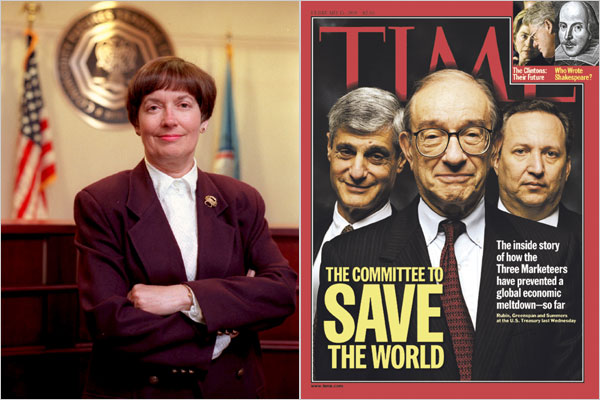OUR nation’s Congressional machinery was humming last week as legislators reconciled the differences between the labyrinthine financial reforms proposed by the Senate and the House and emerged early Friday morning with a voluminous new law in hand. They christened it the Dodd-Frank bill, after the heads of the Senate Banking and House Financial Services Committees who drove the process toward the finish line.
The bill is awash in so much minutiae that by late Friday its ultimate impact on the financial services industry was still unclear. Certainly, the bill, which the full Congress has yet to approve, is the most comprehensive in decades, touching hedge funds, private equity firms, derivatives and credit cards. But is it the “strong Wall Street reform bill,” that Christopher Dodd, the Connecticut Democrat, said it is?
For this law to be the groundbreaking remedy its architects claimed, it needed to do three things very well: protect consumers from abusive financial products, curb dangerous risk taking by institutions and cut big and interconnected financial entities down to size. So far, the report card is mixed.
On the final item, the bill fails completely. After President Obama signs it into law, the nation’s financial industry will still be dominated by a handful of institutions that are too large, too interconnected and too politically powerful to be allowed to go bankrupt if they make unwise decisions or make huge wrong-way bets.
Speaking of large and politically connected entities, Dodd-Frank does nothing about Fannie Mae and Freddie Mac, the $6.5 trillion mortgage finance behemoths that have been wards of the state for almost two years. That was apparently a bridge too far — not surprising, given the support that Mr. Dodd and Mr. Frank lent to Fannie and Freddie back in the good old days when the companies were growing their balance sheets to the bursting point.
So what does the bill do about abusive financial products and curbing financial firms’ appetites for excessive risk?
For consumers and individual investors, Dodd-Frank promises greater scrutiny on financial “innovations,” the products that line bankers’ pockets but can harm users. The creation of a Consumer Financial Protection Bureau within the Federal Reserve Board is intended to bring a much-needed consumer focus to a regulatory regime that was nowhere to be seen during the last 20 years.
It is good that the bill grants this bureau autonomy by assigning it separate financing and an independent director. But the structure of the bureau could have been stronger.
For example, the bill still lets the Office of the Comptroller of the Currency bar state consumer protections where no federal safeguards exist. This is a problem that was well known during the mortgage mania when the comptroller’s office beat back efforts by state authorities to curtail predatory lending.
And Dodd-Frank inexplicably exempts loans provided by auto dealers from the bureau’s oversight. This is as benighted as exempting loans underwritten by mortgage brokers.
Finally, the Financial Stability Oversight Council, the überregulator to be led by the Treasury secretary and made up of top financial regulators, can override the consumer protection bureau’s rules. If the council says a rule threatens the soundness or stability of the financial system, it can be revoked.
Given that financial regulators — and the comptroller’s office is not alone in this — often seem to think that threats to bank profitability can destabilize the financial system, the consumer protection bureau may have a tougher time doing its job than many suppose.
ONE part of the bill that will help consumers and investors is the section exempting high-quality mortgage loans from so-called risk retention requirements. These rules, intended to make mortgage originators more prudent in lending, force them to hold on to 5 percent of a mortgage security that they intend to sell to investors.
But Dodd-Frank sensibly removes high-quality mortgages — those made to creditworthy borrowers with low loan-to-value ratios — from the risk retention rule. Requiring that lenders keep a portion of these loans on their books would make loans more expensive for prudent borrowers; it would likely drive smaller lenders out of the business as well, causing further consolidation in an industry that is already dominated by a few powerful players.
“This goes a long way toward realigning incentives for good underwriting and risk retention where it needs to be retained,” said Jay Diamond, managing director at Annaly Capital Management. “With qualified mortgages, the risk retention is with the borrower who has skin in the game. It’s in the riskier mortgages, where the borrower doesn’t have as much at stake, that the originator should be keeping the risk.”
In the interests of curbing institutional risk-taking, Dodd-Frank rightly takes aim at derivatives and proprietary trading, in which banks make bets using their own money. On derivatives, the bill lets banks conduct trades for customers in interest rate swaps, foreign currency swaps, derivatives referencing gold and silver, and high-grade credit-default swaps. Banks will also be allowed to trade derivatives for themselves if hedging existing positions.
But trading in credit-default swaps referencing lower-grade securities, like subprime mortgages, will have to be run out of bank subsidiaries that are separately capitalized. These subsidiaries may have to raise capital from the parent company, diluting the bank’s existing shareholders.
Banks did win on the section of the bill restricting their investments in private equity firms and hedge funds to 3 percent of bank capital. That number is large enough so as not to be restrictive, and the bill lets banks continue to sponsor and organize such funds.
On proprietary trading, however, the bill gets tough on banks, said Ernest T. Patrikis, a partner at White & Case, by limiting their bets to United States Treasuries, government agency obligations and municipal issues. “Foreign exchange and gold and silver are out,” he said. “This is good for foreign banks if it applies to U.S. banks globally.”
That’s a big if. Even the Glass-Steagall legislation applied only domestically, he noted. Nevertheless, Mr. Patrikis concluded: “The bill is a win for consumers and bad for banks.”
Even so, last Friday, investors seemed to view the bill as positive for banks; an index of their stocks rose 2.7 percent on the day. That reaction is a bit of a mystery, given that higher costs, lower returns and capital raises lie ahead for financial institutions under Dodd-Frank.
Then again, maybe investors are already counting on the banks doing what they do best: figuring out ways around the new rules and restrictions.
© 2010-19 FORECLOSURE FRAUD | by DinSFLA. All rights reserved.












Recent Comments